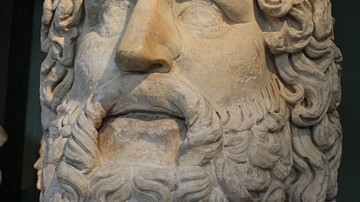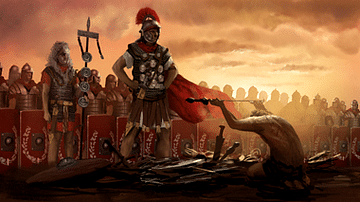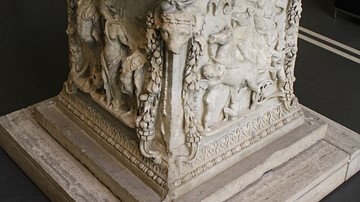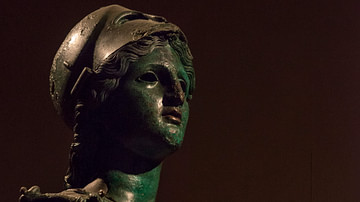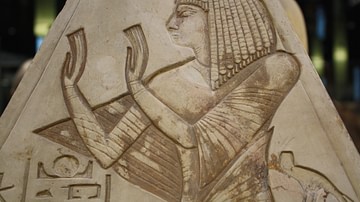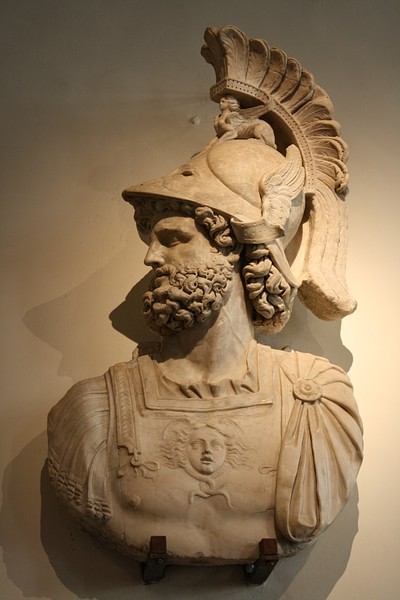
Mars was the Roman god of war and second only to Jupiter in the Roman pantheon. Although most of the myths involving Mars were borrowed from the Greek god of war Ares, Mars did have some uniquely Roman features. Mars is considered more level-headed than the impulsive and disruptive Ares. Mars is also a more virtuous figure to the more martial-oriented Romans.
Mar was a protector of Rome and the Roman way of life. He defended city borders and frontiers. Important festivals connected to warfare were held in his honour and the god was also closely associated with the wolf and woodpecker.
Romulus & Remus
Mars was considered the father of Romulus and Remus, the mythical twin founders of Rome. According to the story, their mother, the Vestal Virgin Rhea Silvia, was raped by Mars while she slept, and in her dreams she had a vision where she dropped a hairpin to the ground, and from which there sprang two twin trees. Over time one of the trees grew so large that it covered the entire world with its shade, a reference to the ultimate success of Romulus and the growth of the huge Roman Empire.
Another myth concerning the god of war, this one uniquely Roman, was his marriage to Anna Perenna. The story is re-told in Ovid's Fasti and begins with Mars falling in love with no less a figure than Minerva, but the virgin goddess of wisdom and crafts, wholly unimpressed, rejected his amorous advances. Wondering how he could better impress Minerva and win her favour, Mars sought the help of Anna Perenna, the aged goddess of New Year and Time. However, Anna Perenna quite fancied the handsome war god for herself, and so she double-crossed Mars by disguising herself as Minerva and, wearing a veil, she tricked the god into marrying her. This famous episode of feminine guile was commemorated in Rome on the Ides of March (the 15th) when young girls would sing risqué songs.
Martius & Festivals
The month of Martius (March) was named after the god. Important festivals and ceremonies, usually connected to the preparation and closure of military campaigns, were held in honour of the god in March and October and carried out by Mars' specially dedicated priests, the flamen Martialis. These rites may also have been connected to agriculture but the nature of Mars' role in this area of Roman life is disputed by scholars. The first festival of the year was actually on the 27th of February with the first Equirria, then followed a busy March. There was the feriae Marti festival, held on the 1st of March (the old New Year's Day), the second Equirria on the 14th, the agonium Martiale on the 17th, the Quinquatrus on the 19th (in later times Minerva would assume Mars' role), and the Tubilustrium on the 23rd of March (and again on the 23rd of May). The details of these festivals are sometimes sketchy, but most were related to war and the instruments of warfare. The Tubilustrium involved a series of rites to cleanse and favour trumpets, whilst the Equirria was to ensure all would be well with the horses when on campaign. Another important ritual was performed by the commander of the army about to depart who shook the sacred spears of the god which were kept in the Regia. The general shouted 'Mars vigilia' and, no doubt, asked for a swift and easy victory.

In addition to the festivals where Mars was the central deity, he was also involved with ceremonies relating to the ancient triad of gods which included himself, Jupiter, and Quirinus. On the 1st, 9th and 23rd of March, the priests of this sacred trio, the Salii, sang hymns and dressed themselves in bronze-age armour which included the ancient ancilia figure-of-eight shields. Mars again took centre stage during the Equus October, held on the 15th of that month. This was when a great horse race was held in the Campus Martius of Rome. No doubt the winner of the race won great honour and favour amongst the public, but the fate of one of the horses of the winning team was less fortunate, for the animal was sacrificed with the head becoming a much sought-after prize by the local residents. Finally, there was the Armilustrium festival on the 19th of October, held on the Aventine and which involved the purification of weapons before they were stored away for the winter.

